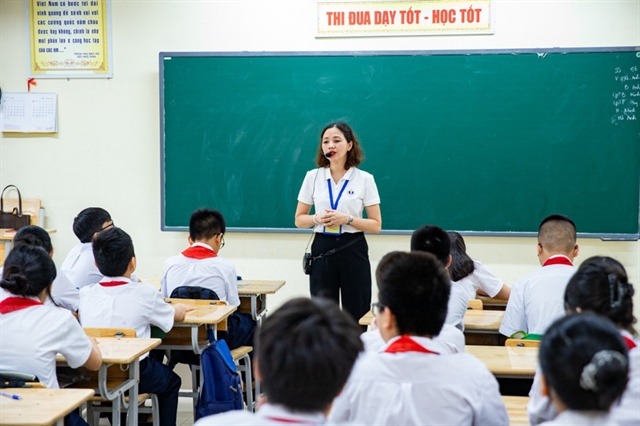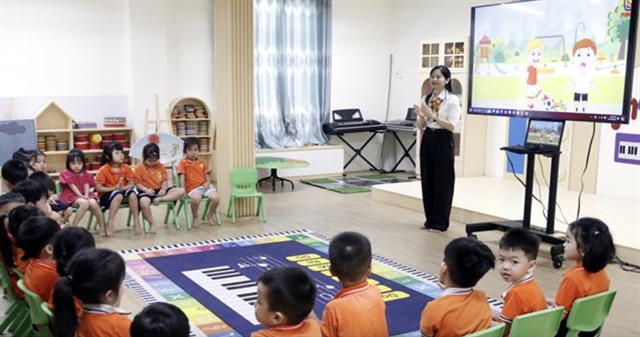 Society
Society

 |
| Teachers are trained and improved in applying AI in teaching. VNA/VNS Photo |
HÀ NỘI — The Việt Nam Education Publishing House and the Hà Nội Department of Education and Training have organised an online workshop on the use of artificial intelligence (AI) materials for administrators and teachers from grades 1 to 12 to strengthen their capacity to apply AI in teaching and learning.
The set of materials was developed to help school leaders and teachers integrate AI into classroom activities meeting the goals for developing digital competence set out in the 2018 General Education Programme.
The training content focused on introducing the objectives, structure and scope of the materials, presenting both print and digital versions, the digital learning ecosystem, the AI assistant platform and supporting tools.
The programme aims to integrate AI into subjects and educational activities in line with the digital competence and artificial intelligence curriculum frameworks issued by the Ministry of Education and Training.
 |
| Training hepls teachers improve in applying AI in teaching. VNA/VNS Photo |
Teachers are guided on how to access and use the digital version, digital learning resources and AI tools in lesson design, classroom management and student assessment.
In addition to theory, teachers also practise on computers with demonstrations based on real teaching situations.
At the primary level, students are first introduced to basic AI concepts and simple applications through images and sounds. At the secondary level, the content expands to include machine learning, data, chatbots and community projects.
At the high school level, AI learning content is broadened and deepened, focusing on practical applications.
Students go beyond basic concepts of data and simple models to explore generative AI, technology capable of creating new text, images, sounds or videos based on learned data.
This represents a leading global technological trend closely associated with widely used tools today such as ChatGPT, text-to-image generators and software that supports music composition or design.
Currently, general education in Việt Nam remains heavily focused on one-way knowledge transmission, lacking the capacity to stimulate critical and creative thinking among students.
In particular, social science subjects such as History, Geography, Literature and Civic Education — though vital in shaping thinking, personality and ethics — are often taught in a dry and unengaging manner.
 |
| A teacher at kindergarten class using AI softwares to supporting the teaching work. VNA/VNS Photo |
The application of AI is expected to give a strong boost to general education by reducing the administrative burden on teachers and enabling them to innovate teaching methods.
Students will be able to access knowledge based on their abilities and develop self-learning and research skills. At the same time, schools and society can enhance training efficiency, contributing to the preparation of a workforce capable of adapting to the knowledge-based economy.
The Ministry of Education and Training has proposed to issue a framework guiding the application of AI in the general education curriculum and strengthen cooperation between schools, businesses and experts to develop AI-based learning platforms suited to Việt Nam’s context.
At the same time, there are policies to support teacher training, especially in social sciences, as well as competitions and experiential activities for students to apply AI to solve social problems.
Many education experts believe that innovating general education methods and applying AI to teaching subjects in schools is an inevitable and urgent trend.
This is an opportunity to improve the quality of education, preparing the young generation with skills, thinking and ethics suited to the requirements of the times.
The success of this process requires the cooperation of managers, teachers, technologists and the whole society. — VNS




